Hexagramme 52 du Yi Jing - Trait 2
L'hexagramme : 52
Un hexagramme est une combinaison de six traits yin et yang.

52.2 (52 > 18) - THE KĂN HEXAGRAM.
The second line, divided, shows its subject keeping the calves of his legs at rest. He cannot help (the subject of the line above) whom he follows, and is dissatisfied in his mind.
Bing DeepL Google Yandex52.2 (52 > 18) - Being attracted irresistibly
The other wants more, one cannot hold them back.
Bing DeepL Google Yandex52.2 (52 > 18) - Being attracted irresistibly
The other wants more, one cannot hold them back.
Bing DeepL Google Yandex52.2 (52 > 18) - Kán, l’arrêt
Kán : ferme, tenir droit, bien réglé, arrêter, reposer
« Arrêter le mouvement des jambes ». (Ou les tenir droites et bien posées.) Si, devant s’arrêter, on ne peut aider celui qui marche devant soi, on doit en avoir du déplaisir.
On doit aider et se rendre au cri d’appel.
52.2 (52 > 18) - Être attiré irrésistiblement
L'autre en veut plus, on ne peut pas le retenir.
Bing DeepL Google YandexLes trigrammes
Les trigrammes sont des combinaisons de trois traits yin et yang. Dans l'hexagramme, les trois traits du dessous constituent le trigramme inférieur et représentent la situation intérieure. Les trois lignes du haut constituent le trigramme supérieur et représentent la situation extérieure.
trigSup

Trigramme inférieur : La montagne Le vent


L'hexagramme nucléaire : 40.1 (40 > 54)
L'hexagramme nucléaire est l'association des deux trigrammes intérieurs (traits 2,3,4 et 3,4,5). Il représente la racine, ou l'origine de la situation.

40.1 (40 > 54) - THE KIEH HEXAGRAM.
The first line, divided, shows that its subject will commit no error.
Bing DeepL Google Yandex40.1 (40 > 54) - Wanting to lose one's constraints
One wants to free oneself, it is a good decision.
Bing DeepL Google Yandex40.1 (40 > 54) - Wanting to lose one's constraints
One wants to free oneself, it is a good decision.
Bing DeepL Google Yandex40.1 (40 > 54) - Kieh, la libération
Kieh : 1. Délivrer, faire échapper, échapper au danger ; 2. Disperser ; 3. Ouvrir, séparer, s’ouvrir. Se dit du mouvement de la germination. 4. Résoudre une difficulté, une complication.
Délivrer quelqu’un est chose excellente.
Quand le fort et le faible s’entendent selon la justice, il n’y a pas de faute à craindre.
40.1 (40 > 54) - Vouloir perdre ses contraintes
On veut se libérer, c'est une bonne décision.
Bing DeepL Google YandexLe dérivé (Fan Yao) : 18.2
Le même trait sur l'hexagramme après la mutation. Il représente ce qui peut être fait APRÈS pour corriger la situation décrite par ce trait, un peu comme un remède ou une solution.

18.2 (18 > 52) - THE KÛ HEXAGRAM.
The second line, undivided, shows (a son) dealing with the troubles caused by his mother. He should not (carry) his firm correctness (to the utmost).
Bing DeepL Google Yandex18.2 (18 > 52) - Kù, l’élimination de la chose pourrie
[color=blue]Kū : délibération, embarras, trouble, soucis.
Celui qui considère les soucis de sa mère gardera le juste milieu.
Bing DeepL Google Yandex18.2 (18 > 52) - Protéger les âmes sensibles
On aide les plus faibles avec douceur.
Bing DeepL Google YandexLa jointure: 17.5
Le dérivé du réciproque. Il représente ce qui aurait pu être fait AVANT pour prévenir la situation décrite par ce trait, un peu comme un remède ou une solution.

17.5 (17 > 51) - THE SUI HEXAGRAM.
The fifth line, undivided, shows us (the ruler) sincere in (fostering all) that is excellent. There will be good fortune.
Bing DeepL Google Yandex17.5 (17 > 51) - Sui, suivre
Sūi : 1. Respect, soumission, conformité à ce qui doit être ; 2. Complaisance ; 3. Fidélité au devoir ; 4. Conséquemment, en ce cas.
La conduite droite, se tenant toujours à ce qui est bon, donnera le succès.
Il en sera ainsi de l’homme en fonction gardant toujours le milieu.
Le réciproque : 51.5
L'hexagramme renversé. Il représente la situation opposée, et en tant que tel est essentiel pour la validation des commentaires.

51.5 (51 > 17) - THE KĂN HEXAGRAM.
The fifth line, divided, shows its subject going and coming amidst the startling movements (of the time), and always in peril ; but perhaps he will not incur loss, and find business (which he can accomplish).
Bing DeepL Google Yandex51.5 (51 > 17) - Getting pushed around
One holds firm when the tremors begin, accompanies the others and endures them until they stop.
Bing DeepL Google Yandex51.5 (51 > 17) - Getting pushed around
One holds firm when the tremors begin, accompanies the others and endures them until they stop.
Bing DeepL Google Yandex51.5 (51 > 17) - Kán, l’ébranlement
Kán : tonnerre, effroi répandu, crainte.
Le tonnerre allant et venant répand l’effroi ; mais on doit tâcher de ne pas abandonner les affaires entreprises. Même dans le danger pressant, on doit garder le milieu.
Bing DeepL Google Yandex51.5 (51 > 17) - Se faire bousculer
On se tient fermement quand les secousses commencent, on accompagne les autres et on les endure jusqu'à ce qu'elles cessent.
Bing DeepL Google Yandex51.5 (51 > 17) - Megrázkódtatás
Szilárdan áll a megrázkódtatás kezdetekor és végigkíséri a többieket míg véget nem ér.
Bing DeepL Google YandexMutations

52.2 (52 > 18) - THE KĂN HEXAGRAM.
The second line, divided, shows its subject keeping the calves of his legs at rest. He cannot help (the subject of the line above) whom he follows, and is dissatisfied in his mind.
Bing DeepL Google Yandex52.2 (52 > 18) - Being attracted irresistibly
The other wants more, one cannot hold them back.
Bing DeepL Google Yandex52.2 (52 > 18) - Being attracted irresistibly
The other wants more, one cannot hold them back.
Bing DeepL Google Yandex52.2 (52 > 18) - Kán, l’arrêt
Kán : ferme, tenir droit, bien réglé, arrêter, reposer
« Arrêter le mouvement des jambes ». (Ou les tenir droites et bien posées.) Si, devant s’arrêter, on ne peut aider celui qui marche devant soi, on doit en avoir du déplaisir.
On doit aider et se rendre au cri d’appel.
52.2 (52 > 18) - Être attiré irrésistiblement
L'autre en veut plus, on ne peut pas le retenir.
Bing DeepL Google Yandex
52.1.2 (52 > 26) - THE KĂN HEXAGRAM.
- 1. The first line, divided, shows its subject keep- ing his toes at rest. There will be no error; but it will be advantageous for him to be persistently firm and correct.
- 2. The second line, divided, shows its subject keeping the calves of his legs at rest. He cannot help (the subject of the line above) whom he follows, and is dissatisfied in his mind.
52.1.2 (52 > 26) - Stop
One pins one's last hopes on a youth whom one has never stopped abusing.
Bing DeepL Google Yandex52.1.2 (52 > 26) - Stop
One pins one's last hopes on a youth whom one has never stopped abusing.
Bing DeepL Google Yandex52.1.2 (52 > 26) - Kán, l’arrêt
Kán : ferme, tenir droit, bien réglé, arrêter, reposer
-
1. (On doit) tenir fermes ses pieds ; i. e. être toujours d’une ferme droiture.
Ne jamais perdre sa droiture. -
2. « Arrêter le mouvement des jambes ». (Ou les tenir droites et bien posées.) Si, devant s’arrêter, on ne peut aider celui qui marche devant soi, on doit en avoir du déplaisir.
On doit aider et se rendre au cri d’appel.
52.1.2 (52 > 26) - Cesser
On place ses derniers espoirs dans une jeunesse que l'on n'a eu de cesse de maltraiter.
Bing DeepL Google Yandex52.1.2 (52 > 26) - Megállás
- 1. Nem megy megnézni mit tesznek a többiek hogy kerülje a bajokat.
- 2. Ha a másik többet akar, nem tarthatja vissza.

52.2.3 (52 > 4) - THE KĂN HEXAGRAM.
- 2. The second line, divided, shows its subject keeping the calves of his legs at rest. He cannot help (the subject of the line above) whom he follows, and is dissatisfied in his mind.
- 3. The third line, undivided, shows its subject keeping his loins at rest, and separating the ribs (from the body below). The situation is perilous, and the heart glows with suppressed excitement.
52.2.3 (52 > 4) - Stop
One wishes to be right sometimes so as to win the esteem of one' s entourage.
Bing DeepL Google Yandex52.2.3 (52 > 4) - Stop
One wishes to be right sometimes so as to win the esteem of one' s entourage.
Bing DeepL Google Yandex52.2.3 (52 > 4) - Kán, l’arrêt
Kán : ferme, tenir droit, bien réglé, arrêter, reposer
-
2. « Arrêter le mouvement des jambes ». (Ou les tenir droites et bien posées.) Si, devant s’arrêter, on ne peut aider celui qui marche devant soi, on doit en avoir du déplaisir.
On doit aider et se rendre au cri d’appel. - 3. Se tenir ferme à sa place et le corps (litt. : les côtes) bien tenu, (c’est ainsi que l’on doit être).
52.2.3 (52 > 4) - Cesser
On souhaite parfois avoir raison pour gagner l'estime de son entourage.
Bing DeepL Google Yandex52.2.3 (52 > 4) - Megállás
- 2. Ha a másik többet akar, nem tarthatja vissza.
- 3. A legalkalmasabbat kéri ha mások nem válaszolnak.

52.1.2.3 (52 > 41) - THE KĂN HEXAGRAM.
- 1. The first line, divided, shows its subject keep- ing his toes at rest. There will be no error; but it will be advantageous for him to be persistently firm and correct.
- 2. The second line, divided, shows its subject keeping the calves of his legs at rest. He cannot help (the subject of the line above) whom he follows, and is dissatisfied in his mind.
- 3. The third line, undivided, shows its subject keeping his loins at rest, and separating the ribs (from the body below). The situation is perilous, and the heart glows with suppressed excitement.
52.1.2.3 (52 > 41) - Stop
One is dropped by friends when one was going to do them good.
Bing DeepL Google Yandex52.1.2.3 (52 > 41) - Stop
One is dropped by friends when one was going to do them good.
Bing DeepL Google Yandex52.1.2.3 (52 > 41) - Kán, l’arrêt
Kán : ferme, tenir droit, bien réglé, arrêter, reposer
-
1. (On doit) tenir fermes ses pieds ; i. e. être toujours d’une ferme droiture.
Ne jamais perdre sa droiture. -
2. « Arrêter le mouvement des jambes ». (Ou les tenir droites et bien posées.) Si, devant s’arrêter, on ne peut aider celui qui marche devant soi, on doit en avoir du déplaisir.
On doit aider et se rendre au cri d’appel. - 3. Se tenir ferme à sa place et le corps (litt. : les côtes) bien tenu, (c’est ainsi que l’on doit être).
52.1.2.3 (52 > 41) - Cesser
On se fait lâcher par ses amis alors qu'on allait leur faire du bien.
Bing DeepL Google Yandex52.1.2.3 (52 > 41) - Megállás
- 1. Nem megy megnézni mit tesznek a többiek hogy kerülje a bajokat.
- 2. Ha a másik többet akar, nem tarthatja vissza.
- 3. A legalkalmasabbat kéri ha mások nem válaszolnak.

52.2.4 (52 > 50) - THE KĂN HEXAGRAM.
- 2. The second line, divided, shows its subject keeping the calves of his legs at rest. He cannot help (the subject of the line above) whom he follows, and is dissatisfied in his mind.
- 4. The fourth line, divided, shows its subject keeping his trunk at rest. There will be no error.
52.2.4 (52 > 50) - Stop
One avoids making special efforts even though this is a recognised personality.
Bing DeepL Google Yandex52.2.4 (52 > 50) - Stop
One avoids making special efforts even though this is a recognized personality.
Bing DeepL Google Yandex52.2.4 (52 > 50) - Kán, l’arrêt
Kán : ferme, tenir droit, bien réglé, arrêter, reposer
-
2. « Arrêter le mouvement des jambes ». (Ou les tenir droites et bien posées.) Si, devant s’arrêter, on ne peut aider celui qui marche devant soi, on doit en avoir du déplaisir.
On doit aider et se rendre au cri d’appel. - 4. Tenir le corps droit et ferme, c’est une bonne manière. [On doit tenir le corps entier tout droit.] (Répétition du § 3 pour en avoir six. Tenir le corps droit est un principe essentiel des rites chinois.)
52.2.4 (52 > 50) - Cesser
On évite de faire des efforts particuliers bien qu'il s'agisse d'une personnalité que l'on a reconnue.
Bing DeepL Google Yandex52.2.4 (52 > 50) - Megállás
- 2. Ha a másik többet akar, nem tarthatja vissza.
- 4. Megáll, de mások folytatják.

52.1.2.4 (52 > 14) - THE KĂN HEXAGRAM.
- 1. The first line, divided, shows its subject keep- ing his toes at rest. There will be no error; but it will be advantageous for him to be persistently firm and correct.
- 2. The second line, divided, shows its subject keeping the calves of his legs at rest. He cannot help (the subject of the line above) whom he follows, and is dissatisfied in his mind.
- 4. The fourth line, divided, shows its subject keeping his trunk at rest. There will be no error.
52.1.2.4 (52 > 14) - Stop
One slows down those who get involved too quickly.
Bing DeepL Google Yandex52.1.2.4 (52 > 14) - Stop
One slows down those who get involved too quickly.
Bing DeepL Google Yandex52.1.2.4 (52 > 14) - Kán, l’arrêt
Kán : ferme, tenir droit, bien réglé, arrêter, reposer
-
1. (On doit) tenir fermes ses pieds ; i. e. être toujours d’une ferme droiture.
Ne jamais perdre sa droiture. -
2. « Arrêter le mouvement des jambes ». (Ou les tenir droites et bien posées.) Si, devant s’arrêter, on ne peut aider celui qui marche devant soi, on doit en avoir du déplaisir.
On doit aider et se rendre au cri d’appel. - 4. Tenir le corps droit et ferme, c’est une bonne manière. [On doit tenir le corps entier tout droit.] (Répétition du § 3 pour en avoir six. Tenir le corps droit est un principe essentiel des rites chinois.)
52.1.2.4 (52 > 14) - Megállás
- 1. Nem megy megnézni mit tesznek a többiek hogy kerülje a bajokat.
- 2. Ha a másik többet akar, nem tarthatja vissza.
- 4. Megáll, de mások folytatják.

52.2.3.4 (52 > 64) - THE KĂN HEXAGRAM.
- 2. The second line, divided, shows its subject keeping the calves of his legs at rest. He cannot help (the subject of the line above) whom he follows, and is dissatisfied in his mind.
- 3. The third line, undivided, shows its subject keeping his loins at rest, and separating the ribs (from the body below). The situation is perilous, and the heart glows with suppressed excitement.
- 4. The fourth line, divided, shows its subject keeping his trunk at rest. There will be no error.
52.2.3.4 (52 > 64) - Stop
One senses that another solution would have been more advantageous.
Bing DeepL Google Yandex52.2.3.4 (52 > 64) - Stop
One senses that another solution would have been more advantageous.
Bing DeepL Google Yandex52.2.3.4 (52 > 64) - Kán, l’arrêt
Kán : ferme, tenir droit, bien réglé, arrêter, reposer
-
2. « Arrêter le mouvement des jambes ». (Ou les tenir droites et bien posées.) Si, devant s’arrêter, on ne peut aider celui qui marche devant soi, on doit en avoir du déplaisir.
On doit aider et se rendre au cri d’appel. - 3. Se tenir ferme à sa place et le corps (litt. : les côtes) bien tenu, (c’est ainsi que l’on doit être).
- 4. Tenir le corps droit et ferme, c’est une bonne manière. [On doit tenir le corps entier tout droit.] (Répétition du § 3 pour en avoir six. Tenir le corps droit est un principe essentiel des rites chinois.)
52.2.3.4 (52 > 64) - Cesser
On pressent qu'une autre solution aurait été plus avantageuse.
Bing DeepL Google Yandex52.2.3.4 (52 > 64) - Megállás
- 2. Ha a másik többet akar, nem tarthatja vissza.
- 3. A legalkalmasabbat kéri ha mások nem válaszolnak.
- 4. Megáll, de mások folytatják.

52.1.2.3.4 (52 > 38) - THE KĂN HEXAGRAM.
- 1. The first line, divided, shows its subject keep- ing his toes at rest. There will be no error; but it will be advantageous for him to be persistently firm and correct.
- 2. The second line, divided, shows its subject keeping the calves of his legs at rest. He cannot help (the subject of the line above) whom he follows, and is dissatisfied in his mind.
- 3. The third line, undivided, shows its subject keeping his loins at rest, and separating the ribs (from the body below). The situation is perilous, and the heart glows with suppressed excitement.
- 4. The fourth line, divided, shows its subject keeping his trunk at rest. There will be no error.
52.1.2.3.4 (52 > 38) - Stop
One tells others old jokes to fill the silence.
Bing DeepL Google Yandex52.1.2.3.4 (52 > 38) - Stop
One tells others old jokes to fill the silence.
Bing DeepL Google Yandex52.1.2.3.4 (52 > 38) - Kán, l’arrêt
Kán : ferme, tenir droit, bien réglé, arrêter, reposer
-
1. (On doit) tenir fermes ses pieds ; i. e. être toujours d’une ferme droiture.
Ne jamais perdre sa droiture. -
2. « Arrêter le mouvement des jambes ». (Ou les tenir droites et bien posées.) Si, devant s’arrêter, on ne peut aider celui qui marche devant soi, on doit en avoir du déplaisir.
On doit aider et se rendre au cri d’appel. - 3. Se tenir ferme à sa place et le corps (litt. : les côtes) bien tenu, (c’est ainsi que l’on doit être).
- 4. Tenir le corps droit et ferme, c’est une bonne manière. [On doit tenir le corps entier tout droit.] (Répétition du § 3 pour en avoir six. Tenir le corps droit est un principe essentiel des rites chinois.)
52.1.2.3.4 (52 > 38) - Cesser
On raconte aux autres des blagues éculées pour meubler le silence.
Bing DeepL Google Yandex52.1.2.3.4 (52 > 38) - Megállás
- 1. Nem megy megnézni mit tesznek a többiek hogy kerülje a bajokat.
- 2. Ha a másik többet akar, nem tarthatja vissza.
- 3. A legalkalmasabbat kéri ha mások nem válaszolnak.
- 4. Megáll, de mások folytatják.

52.2.5 (52 > 57) - THE KĂN HEXAGRAM.
- 2. The second line, divided, shows its subject keeping the calves of his legs at rest. He cannot help (the subject of the line above) whom he follows, and is dissatisfied in his mind.
- 5. The fifth line, divided, shows its subject keeping his jawbones at rest, so that his words are (all) orderly. Occasion for repentance will disappear.
52.2.5 (52 > 57) - Stop
One knows of few cases where others have been satisfied with a given word.
Bing DeepL Google Yandex52.2.5 (52 > 57) - Stop
One knows of few cases where others have been satisfied with a given word.
Bing DeepL Google Yandex52.2.5 (52 > 57) - Kán, l’arrêt
Kán : ferme, tenir droit, bien réglé, arrêter, reposer
-
2. « Arrêter le mouvement des jambes ». (Ou les tenir droites et bien posées.) Si, devant s’arrêter, on ne peut aider celui qui marche devant soi, on doit en avoir du déplaisir.
On doit aider et se rendre au cri d’appel. -
5. Tenir ses mâchoires de sorte que les paroles sortent de la bouche avec ordre et mesure, cela exempte de repentir.
On sait ainsi conserver le milieu.
52.2.5 (52 > 57) - Cesser
On connaît peu de cas où les autres se sont contentés d'une parole donnée.
Bing DeepL Google Yandex52.2.5 (52 > 57) - Megállás
- 2. Ha a másik többet akar, nem tarthatja vissza.
- 5. Nem fejti ki kételyeit hogy ne okozzon nehézségeket.

52.1.2.5 (52 > 9) - THE KĂN HEXAGRAM.
- 1. The first line, divided, shows its subject keep- ing his toes at rest. There will be no error; but it will be advantageous for him to be persistently firm and correct.
- 2. The second line, divided, shows its subject keeping the calves of his legs at rest. He cannot help (the subject of the line above) whom he follows, and is dissatisfied in his mind.
- 5. The fifth line, divided, shows its subject keeping his jawbones at rest, so that his words are (all) orderly. Occasion for repentance will disappear.
52.1.2.5 (52 > 9) - Kán, l’arrêt
Kán : ferme, tenir droit, bien réglé, arrêter, reposer
-
1. (On doit) tenir fermes ses pieds ; i. e. être toujours d’une ferme droiture.
Ne jamais perdre sa droiture. -
2. « Arrêter le mouvement des jambes ». (Ou les tenir droites et bien posées.) Si, devant s’arrêter, on ne peut aider celui qui marche devant soi, on doit en avoir du déplaisir.
On doit aider et se rendre au cri d’appel. -
5. Tenir ses mâchoires de sorte que les paroles sortent de la bouche avec ordre et mesure, cela exempte de repentir.
On sait ainsi conserver le milieu.
52.1.2.5 (52 > 9) - Megállás
- 1. Nem megy megnézni mit tesznek a többiek hogy kerülje a bajokat.
- 2. Ha a másik többet akar, nem tarthatja vissza.
- 5. Nem fejti ki kételyeit hogy ne okozzon nehézségeket.

52.2.3.5 (52 > 59) - THE KĂN HEXAGRAM.
- 2. The second line, divided, shows its subject keeping the calves of his legs at rest. He cannot help (the subject of the line above) whom he follows, and is dissatisfied in his mind.
- 3. The third line, undivided, shows its subject keeping his loins at rest, and separating the ribs (from the body below). The situation is perilous, and the heart glows with suppressed excitement.
- 5. The fifth line, divided, shows its subject keeping his jawbones at rest, so that his words are (all) orderly. Occasion for repentance will disappear.
52.2.3.5 (52 > 59) - Kán, l’arrêt
Kán : ferme, tenir droit, bien réglé, arrêter, reposer
-
2. « Arrêter le mouvement des jambes ». (Ou les tenir droites et bien posées.) Si, devant s’arrêter, on ne peut aider celui qui marche devant soi, on doit en avoir du déplaisir.
On doit aider et se rendre au cri d’appel. - 3. Se tenir ferme à sa place et le corps (litt. : les côtes) bien tenu, (c’est ainsi que l’on doit être).
-
5. Tenir ses mâchoires de sorte que les paroles sortent de la bouche avec ordre et mesure, cela exempte de repentir.
On sait ainsi conserver le milieu.
52.2.3.5 (52 > 59) - Cesser
On sort de son cocon pour affronter la vie réelle.
Bing DeepL Google Yandex52.2.3.5 (52 > 59) - Megállás
- 2. Ha a másik többet akar, nem tarthatja vissza.
- 3. A legalkalmasabbat kéri ha mások nem válaszolnak.
- 5. Nem fejti ki kételyeit hogy ne okozzon nehézségeket.

52.1.2.3.5 (52 > 61) - THE KĂN HEXAGRAM.
- 1. The first line, divided, shows its subject keep- ing his toes at rest. There will be no error; but it will be advantageous for him to be persistently firm and correct.
- 2. The second line, divided, shows its subject keeping the calves of his legs at rest. He cannot help (the subject of the line above) whom he follows, and is dissatisfied in his mind.
- 3. The third line, undivided, shows its subject keeping his loins at rest, and separating the ribs (from the body below). The situation is perilous, and the heart glows with suppressed excitement.
- 5. The fifth line, divided, shows its subject keeping his jawbones at rest, so that his words are (all) orderly. Occasion for repentance will disappear.
52.1.2.3.5 (52 > 61) - Stop
One returns their gifts to others so as not having to justify oneself to them.
Bing DeepL Google Yandex52.1.2.3.5 (52 > 61) - Stop
One returns their gifts to others so as not having to justify oneself to them.
Bing DeepL Google Yandex52.1.2.3.5 (52 > 61) - Kán, l’arrêt
Kán : ferme, tenir droit, bien réglé, arrêter, reposer
-
1. (On doit) tenir fermes ses pieds ; i. e. être toujours d’une ferme droiture.
Ne jamais perdre sa droiture. -
2. « Arrêter le mouvement des jambes ». (Ou les tenir droites et bien posées.) Si, devant s’arrêter, on ne peut aider celui qui marche devant soi, on doit en avoir du déplaisir.
On doit aider et se rendre au cri d’appel. - 3. Se tenir ferme à sa place et le corps (litt. : les côtes) bien tenu, (c’est ainsi que l’on doit être).
-
5. Tenir ses mâchoires de sorte que les paroles sortent de la bouche avec ordre et mesure, cela exempte de repentir.
On sait ainsi conserver le milieu.
52.1.2.3.5 (52 > 61) - Cesser
On rend leurs dons aux autres pour ne pas avoir à se justifier devant eux.
Bing DeepL Google Yandex52.1.2.3.5 (52 > 61) - Megállás
- 1. Nem megy megnézni mit tesznek a többiek hogy kerülje a bajokat.
- 2. Ha a másik többet akar, nem tarthatja vissza.
- 3. A legalkalmasabbat kéri ha mások nem válaszolnak.
- 5. Nem fejti ki kételyeit hogy ne okozzon nehézségeket.

52.2.4.5 (52 > 44) - THE KĂN HEXAGRAM.
- 2. The second line, divided, shows its subject keeping the calves of his legs at rest. He cannot help (the subject of the line above) whom he follows, and is dissatisfied in his mind.
- 4. The fourth line, divided, shows its subject keeping his trunk at rest. There will be no error.
- 5. The fifth line, divided, shows its subject keeping his jawbones at rest, so that his words are (all) orderly. Occasion for repentance will disappear.
52.2.4.5 (52 > 44) - Kán, l’arrêt
Kán : ferme, tenir droit, bien réglé, arrêter, reposer
-
2. « Arrêter le mouvement des jambes ». (Ou les tenir droites et bien posées.) Si, devant s’arrêter, on ne peut aider celui qui marche devant soi, on doit en avoir du déplaisir.
On doit aider et se rendre au cri d’appel. - 4. Tenir le corps droit et ferme, c’est une bonne manière. [On doit tenir le corps entier tout droit.] (Répétition du § 3 pour en avoir six. Tenir le corps droit est un principe essentiel des rites chinois.)
-
5. Tenir ses mâchoires de sorte que les paroles sortent de la bouche avec ordre et mesure, cela exempte de repentir.
On sait ainsi conserver le milieu.
52.2.4.5 (52 > 44) - Megállás
- 2. Ha a másik többet akar, nem tarthatja vissza.
- 4. Megáll, de mások folytatják.
- 5. Nem fejti ki kételyeit hogy ne okozzon nehézségeket.

52.1.2.4.5 (52 > 1) - THE KĂN HEXAGRAM.
- 1. The first line, divided, shows its subject keep- ing his toes at rest. There will be no error; but it will be advantageous for him to be persistently firm and correct.
- 2. The second line, divided, shows its subject keeping the calves of his legs at rest. He cannot help (the subject of the line above) whom he follows, and is dissatisfied in his mind.
- 4. The fourth line, divided, shows its subject keeping his trunk at rest. There will be no error.
- 5. The fifth line, divided, shows its subject keeping his jawbones at rest, so that his words are (all) orderly. Occasion for repentance will disappear.
52.1.2.4.5 (52 > 1) - Stopping to be recognised
One wants others to notice the progress that one has made.
Bing DeepL Google Yandex52.1.2.4.5 (52 > 1) - Stopping to be recognized
One wants others to notice the progress that one has made.
Bing DeepL Google Yandex52.1.2.4.5 (52 > 1) - Kán, l’arrêt
Kán : ferme, tenir droit, bien réglé, arrêter, reposer
-
1. (On doit) tenir fermes ses pieds ; i. e. être toujours d’une ferme droiture.
Ne jamais perdre sa droiture. -
2. « Arrêter le mouvement des jambes ». (Ou les tenir droites et bien posées.) Si, devant s’arrêter, on ne peut aider celui qui marche devant soi, on doit en avoir du déplaisir.
On doit aider et se rendre au cri d’appel. - 4. Tenir le corps droit et ferme, c’est une bonne manière. [On doit tenir le corps entier tout droit.] (Répétition du § 3 pour en avoir six. Tenir le corps droit est un principe essentiel des rites chinois.)
-
5. Tenir ses mâchoires de sorte que les paroles sortent de la bouche avec ordre et mesure, cela exempte de repentir.
On sait ainsi conserver le milieu.
52.1.2.4.5 (52 > 1) - S'arrêter pour être reconnu
On veut que les autres remarquent les progrès que l'on a fait.
Bing DeepL Google Yandex52.1.2.4.5 (52 > 1) - Megállás
- 1. Nem megy megnézni mit tesznek a többiek hogy kerülje a bajokat.
- 2. Ha a másik többet akar, nem tarthatja vissza.
- 4. Megáll, de mások folytatják.
- 5. Nem fejti ki kételyeit hogy ne okozzon nehézségeket.

52.2.3.4.5 (52 > 6) - THE KĂN HEXAGRAM.
- 2. The second line, divided, shows its subject keeping the calves of his legs at rest. He cannot help (the subject of the line above) whom he follows, and is dissatisfied in his mind.
- 3. The third line, undivided, shows its subject keeping his loins at rest, and separating the ribs (from the body below). The situation is perilous, and the heart glows with suppressed excitement.
- 4. The fourth line, divided, shows its subject keeping his trunk at rest. There will be no error.
- 5. The fifth line, divided, shows its subject keeping his jawbones at rest, so that his words are (all) orderly. Occasion for repentance will disappear.
52.2.3.4.5 (52 > 6) - Stop
One is going to be threatened if one keeps doing mistakes.
Bing DeepL Google Yandex52.2.3.4.5 (52 > 6) - Stop
One is going to be threatened if one keeps doing mistakes.
Bing DeepL Google Yandex52.2.3.4.5 (52 > 6) - Kán, l’arrêt
Kán : ferme, tenir droit, bien réglé, arrêter, reposer
-
2. « Arrêter le mouvement des jambes ». (Ou les tenir droites et bien posées.) Si, devant s’arrêter, on ne peut aider celui qui marche devant soi, on doit en avoir du déplaisir.
On doit aider et se rendre au cri d’appel. - 3. Se tenir ferme à sa place et le corps (litt. : les côtes) bien tenu, (c’est ainsi que l’on doit être).
- 4. Tenir le corps droit et ferme, c’est une bonne manière. [On doit tenir le corps entier tout droit.] (Répétition du § 3 pour en avoir six. Tenir le corps droit est un principe essentiel des rites chinois.)
-
5. Tenir ses mâchoires de sorte que les paroles sortent de la bouche avec ordre et mesure, cela exempte de repentir.
On sait ainsi conserver le milieu.
52.2.3.4.5 (52 > 6) - Cesser
On va être menacé si l'on continue de faire des bêtises.
Bing DeepL Google Yandex52.2.3.4.5 (52 > 6) - Megállás
- 2. Ha a másik többet akar, nem tarthatja vissza.
- 3. A legalkalmasabbat kéri ha mások nem válaszolnak.
- 4. Megáll, de mások folytatják.
- 5. Nem fejti ki kételyeit hogy ne okozzon nehézségeket.

52.1.2.3.4.5 (52 > 10) - THE KĂN HEXAGRAM.
- 1. The first line, divided, shows its subject keep- ing his toes at rest. There will be no error; but it will be advantageous for him to be persistently firm and correct.
- 2. The second line, divided, shows its subject keeping the calves of his legs at rest. He cannot help (the subject of the line above) whom he follows, and is dissatisfied in his mind.
- 3. The third line, undivided, shows its subject keeping his loins at rest, and separating the ribs (from the body below). The situation is perilous, and the heart glows with suppressed excitement.
- 4. The fourth line, divided, shows its subject keeping his trunk at rest. There will be no error.
- 5. The fifth line, divided, shows its subject keeping his jawbones at rest, so that his words are (all) orderly. Occasion for repentance will disappear.
52.1.2.3.4.5 (52 > 10) - Stop
One feels that the atmosphere has become heavier after having asked others to stop lying.
Bing DeepL Google Yandex52.1.2.3.4.5 (52 > 10) - Stop
One feels that the atmosphere has become heavier after having asked others to stop lying.
Bing DeepL Google Yandex52.1.2.3.4.5 (52 > 10) - Kán, l’arrêt
Kán : ferme, tenir droit, bien réglé, arrêter, reposer
-
1. (On doit) tenir fermes ses pieds ; i. e. être toujours d’une ferme droiture.
Ne jamais perdre sa droiture. -
2. « Arrêter le mouvement des jambes ». (Ou les tenir droites et bien posées.) Si, devant s’arrêter, on ne peut aider celui qui marche devant soi, on doit en avoir du déplaisir.
On doit aider et se rendre au cri d’appel. - 3. Se tenir ferme à sa place et le corps (litt. : les côtes) bien tenu, (c’est ainsi que l’on doit être).
- 4. Tenir le corps droit et ferme, c’est une bonne manière. [On doit tenir le corps entier tout droit.] (Répétition du § 3 pour en avoir six. Tenir le corps droit est un principe essentiel des rites chinois.)
-
5. Tenir ses mâchoires de sorte que les paroles sortent de la bouche avec ordre et mesure, cela exempte de repentir.
On sait ainsi conserver le milieu.
52.1.2.3.4.5 (52 > 10) - Cesser
On sent que l'atmosphère s'est alourdie après avoir demandé aux autres d'arrêter de mentir.
Bing DeepL Google Yandex52.1.2.3.4.5 (52 > 10) - Megállás
- 1. Nem megy megnézni mit tesznek a többiek hogy kerülje a bajokat.
- 2. Ha a másik többet akar, nem tarthatja vissza.
- 3. A legalkalmasabbat kéri ha mások nem válaszolnak.
- 4. Megáll, de mások folytatják.
- 5. Nem fejti ki kételyeit hogy ne okozzon nehézségeket.

52.2.6 (52 > 46) - THE KĂN HEXAGRAM.
- 2. The second line, divided, shows its subject keeping the calves of his legs at rest. He cannot help (the subject of the line above) whom he follows, and is dissatisfied in his mind.
- 6. The sixth line, undivided, shows its subject devotedly maintaining his restfulness. There will be good fortune.
52.2.6 (52 > 46) - Stop
One tempers one's ardour by doing spiritual exercises.
Bing DeepL Google Yandex52.2.6 (52 > 46) - Stop
One tempers one's ardor by doing spiritual exercises.
Bing DeepL Google Yandex52.2.6 (52 > 46) - Kán, l’arrêt
Kán : ferme, tenir droit, bien réglé, arrêter, reposer
-
2. « Arrêter le mouvement des jambes ». (Ou les tenir droites et bien posées.) Si, devant s’arrêter, on ne peut aider celui qui marche devant soi, on doit en avoir du déplaisir.
On doit aider et se rendre au cri d’appel. -
6. Être tout appliqué à rester ferme dans le bien est une disposition très heureuse.
On peut ainsi être juste et droit jusqu’à la fin.
52.2.6 (52 > 46) - Cesser
On tempère ses ardeurs en faisant des exercices spirituels.
Bing DeepL Google Yandex52.2.6 (52 > 46) - Megállás
- 2. Ha a másik többet akar, nem tarthatja vissza.
- 6. Tanulmányozza környezete igényeit mielőtt foglalkozna azokkal.

52.1.2.6 (52 > 11) - THE KĂN HEXAGRAM.
- 1. The first line, divided, shows its subject keep- ing his toes at rest. There will be no error; but it will be advantageous for him to be persistently firm and correct.
- 2. The second line, divided, shows its subject keeping the calves of his legs at rest. He cannot help (the subject of the line above) whom he follows, and is dissatisfied in his mind.
- 6. The sixth line, undivided, shows its subject devotedly maintaining his restfulness. There will be good fortune.
52.1.2.6 (52 > 11) - Stop
One explains to one's close relations what they must do to avoid being left without resources.
Bing DeepL Google Yandex52.1.2.6 (52 > 11) - Stop
One explains to one's close relations what they must do to avoid being left without resources.
Bing DeepL Google Yandex52.1.2.6 (52 > 11) - Kán, l’arrêt
Kán : ferme, tenir droit, bien réglé, arrêter, reposer
-
1. (On doit) tenir fermes ses pieds ; i. e. être toujours d’une ferme droiture.
Ne jamais perdre sa droiture. -
2. « Arrêter le mouvement des jambes ». (Ou les tenir droites et bien posées.) Si, devant s’arrêter, on ne peut aider celui qui marche devant soi, on doit en avoir du déplaisir.
On doit aider et se rendre au cri d’appel. -
6. Être tout appliqué à rester ferme dans le bien est une disposition très heureuse.
On peut ainsi être juste et droit jusqu’à la fin.
52.1.2.6 (52 > 11) - Cesser
On explique à ses proches ce qu'ils doivent faire pour ne pas se retrouver sans ressources.
Bing DeepL Google Yandex52.1.2.6 (52 > 11) - Megállás
- 1. Nem megy megnézni mit tesznek a többiek hogy kerülje a bajokat.
- 2. Ha a másik többet akar, nem tarthatja vissza.
- 6. Tanulmányozza környezete igényeit mielőtt foglalkozna azokkal.
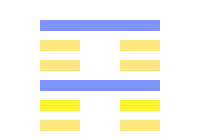
52.2.3.6 (52 > 7) - THE KĂN HEXAGRAM.
- 2. The second line, divided, shows its subject keeping the calves of his legs at rest. He cannot help (the subject of the line above) whom he follows, and is dissatisfied in his mind.
- 3. The third line, undivided, shows its subject keeping his loins at rest, and separating the ribs (from the body below). The situation is perilous, and the heart glows with suppressed excitement.
- 6. The sixth line, undivided, shows its subject devotedly maintaining his restfulness. There will be good fortune.
52.2.3.6 (52 > 7) - Kán, l’arrêt
Kán : ferme, tenir droit, bien réglé, arrêter, reposer
-
2. « Arrêter le mouvement des jambes ». (Ou les tenir droites et bien posées.) Si, devant s’arrêter, on ne peut aider celui qui marche devant soi, on doit en avoir du déplaisir.
On doit aider et se rendre au cri d’appel. - 3. Se tenir ferme à sa place et le corps (litt. : les côtes) bien tenu, (c’est ainsi que l’on doit être).
-
6. Être tout appliqué à rester ferme dans le bien est une disposition très heureuse.
On peut ainsi être juste et droit jusqu’à la fin.
52.2.3.6 (52 > 7) - Cesser
On s'est donné pour objectif de régler un différend.
Bing DeepL Google Yandex52.2.3.6 (52 > 7) - Megállás
- 2. Ha a másik többet akar, nem tarthatja vissza.
- 3. A legalkalmasabbat kéri ha mások nem válaszolnak.
- 6. Tanulmányozza környezete igényeit mielőtt foglalkozna azokkal.

52.1.2.3.6 (52 > 19) - THE KĂN HEXAGRAM.
- 1. The first line, divided, shows its subject keep- ing his toes at rest. There will be no error; but it will be advantageous for him to be persistently firm and correct.
- 2. The second line, divided, shows its subject keeping the calves of his legs at rest. He cannot help (the subject of the line above) whom he follows, and is dissatisfied in his mind.
- 3. The third line, undivided, shows its subject keeping his loins at rest, and separating the ribs (from the body below). The situation is perilous, and the heart glows with suppressed excitement.
- 6. The sixth line, undivided, shows its subject devotedly maintaining his restfulness. There will be good fortune.
52.1.2.3.6 (52 > 19) - Stop
Each one spies on the other so as not to lose sight of each other.
Bing DeepL Google Yandex52.1.2.3.6 (52 > 19) - Stop
Each one spies on the other so as not to lose sight of each other.
Bing DeepL Google Yandex52.1.2.3.6 (52 > 19) - Kán, l’arrêt
Kán : ferme, tenir droit, bien réglé, arrêter, reposer
-
1. (On doit) tenir fermes ses pieds ; i. e. être toujours d’une ferme droiture.
Ne jamais perdre sa droiture. -
2. « Arrêter le mouvement des jambes ». (Ou les tenir droites et bien posées.) Si, devant s’arrêter, on ne peut aider celui qui marche devant soi, on doit en avoir du déplaisir.
On doit aider et se rendre au cri d’appel. - 3. Se tenir ferme à sa place et le corps (litt. : les côtes) bien tenu, (c’est ainsi que l’on doit être).
-
6. Être tout appliqué à rester ferme dans le bien est une disposition très heureuse.
On peut ainsi être juste et droit jusqu’à la fin.
52.1.2.3.6 (52 > 19) - Megállás
- 1. Nem megy megnézni mit tesznek a többiek hogy kerülje a bajokat.
- 2. Ha a másik többet akar, nem tarthatja vissza.
- 3. A legalkalmasabbat kéri ha mások nem válaszolnak.
- 6. Tanulmányozza környezete igényeit mielőtt foglalkozna azokkal.

52.2.4.6 (52 > 32) - THE KĂN HEXAGRAM.
- 2. The second line, divided, shows its subject keeping the calves of his legs at rest. He cannot help (the subject of the line above) whom he follows, and is dissatisfied in his mind.
- 4. The fourth line, divided, shows its subject keeping his trunk at rest. There will be no error.
- 6. The sixth line, undivided, shows its subject devotedly maintaining his restfulness. There will be good fortune.
52.2.4.6 (52 > 32) - Kán, l’arrêt
Kán : ferme, tenir droit, bien réglé, arrêter, reposer
-
2. « Arrêter le mouvement des jambes ». (Ou les tenir droites et bien posées.) Si, devant s’arrêter, on ne peut aider celui qui marche devant soi, on doit en avoir du déplaisir.
On doit aider et se rendre au cri d’appel. - 4. Tenir le corps droit et ferme, c’est une bonne manière. [On doit tenir le corps entier tout droit.] (Répétition du § 3 pour en avoir six. Tenir le corps droit est un principe essentiel des rites chinois.)
-
6. Être tout appliqué à rester ferme dans le bien est une disposition très heureuse.
On peut ainsi être juste et droit jusqu’à la fin.
52.2.4.6 (52 > 32) - Cesser
On récapitule avant de commencer une nouvelle leçon.
Bing DeepL Google Yandex52.2.4.6 (52 > 32) - Megállás
- 2. Ha a másik többet akar, nem tarthatja vissza.
- 4. Megáll, de mások folytatják.
- 6. Tanulmányozza környezete igényeit mielőtt foglalkozna azokkal.

52.1.2.4.6 (52 > 34) - THE KĂN HEXAGRAM.
- 1. The first line, divided, shows its subject keep- ing his toes at rest. There will be no error; but it will be advantageous for him to be persistently firm and correct.
- 2. The second line, divided, shows its subject keeping the calves of his legs at rest. He cannot help (the subject of the line above) whom he follows, and is dissatisfied in his mind.
- 4. The fourth line, divided, shows its subject keeping his trunk at rest. There will be no error.
- 6. The sixth line, undivided, shows its subject devotedly maintaining his restfulness. There will be good fortune.
52.1.2.4.6 (52 > 34) - Stop
One is absolutely sure that one has taken all the measures that others wanted.
Bing DeepL Google Yandex52.1.2.4.6 (52 > 34) - Stop
One is absolutely sure that one has taken all the measures that others wanted.
Bing DeepL Google Yandex52.1.2.4.6 (52 > 34) - Kán, l’arrêt
Kán : ferme, tenir droit, bien réglé, arrêter, reposer
-
1. (On doit) tenir fermes ses pieds ; i. e. être toujours d’une ferme droiture.
Ne jamais perdre sa droiture. -
2. « Arrêter le mouvement des jambes ». (Ou les tenir droites et bien posées.) Si, devant s’arrêter, on ne peut aider celui qui marche devant soi, on doit en avoir du déplaisir.
On doit aider et se rendre au cri d’appel. - 4. Tenir le corps droit et ferme, c’est une bonne manière. [On doit tenir le corps entier tout droit.] (Répétition du § 3 pour en avoir six. Tenir le corps droit est un principe essentiel des rites chinois.)
-
6. Être tout appliqué à rester ferme dans le bien est une disposition très heureuse.
On peut ainsi être juste et droit jusqu’à la fin.
52.1.2.4.6 (52 > 34) - Cesser
On est sûr et certain d'avoir pris toutes les mesures que les autres désiraient.
Bing DeepL Google Yandex52.1.2.4.6 (52 > 34) - Megállás
- 1. Nem megy megnézni mit tesznek a többiek hogy kerülje a bajokat.
- 2. Ha a másik többet akar, nem tarthatja vissza.
- 4. Megáll, de mások folytatják.
- 6. Tanulmányozza környezete igényeit mielőtt foglalkozna azokkal.
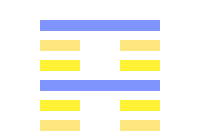
52.2.3.4.6 (52 > 40) - THE KĂN HEXAGRAM.
- 2. The second line, divided, shows its subject keeping the calves of his legs at rest. He cannot help (the subject of the line above) whom he follows, and is dissatisfied in his mind.
- 3. The third line, undivided, shows its subject keeping his loins at rest, and separating the ribs (from the body below). The situation is perilous, and the heart glows with suppressed excitement.
- 4. The fourth line, divided, shows its subject keeping his trunk at rest. There will be no error.
- 6. The sixth line, undivided, shows its subject devotedly maintaining his restfulness. There will be good fortune.
52.2.3.4.6 (52 > 40) - Stop
One gives consent with regrets so as not to sadden others.
Bing DeepL Google Yandex52.2.3.4.6 (52 > 40) - Stop
One gives consent with regrets so as not to sadden others.
Bing DeepL Google Yandex52.2.3.4.6 (52 > 40) - Kán, l’arrêt
Kán : ferme, tenir droit, bien réglé, arrêter, reposer
-
2. « Arrêter le mouvement des jambes ». (Ou les tenir droites et bien posées.) Si, devant s’arrêter, on ne peut aider celui qui marche devant soi, on doit en avoir du déplaisir.
On doit aider et se rendre au cri d’appel. - 3. Se tenir ferme à sa place et le corps (litt. : les côtes) bien tenu, (c’est ainsi que l’on doit être).
- 4. Tenir le corps droit et ferme, c’est une bonne manière. [On doit tenir le corps entier tout droit.] (Répétition du § 3 pour en avoir six. Tenir le corps droit est un principe essentiel des rites chinois.)
-
6. Être tout appliqué à rester ferme dans le bien est une disposition très heureuse.
On peut ainsi être juste et droit jusqu’à la fin.
52.2.3.4.6 (52 > 40) - Cesser
On donne son accord à regret pour ne pas faire de la peine aux autres.
Bing DeepL Google Yandex52.2.3.4.6 (52 > 40) - Megállás
- 2. Ha a másik többet akar, nem tarthatja vissza.
- 3. A legalkalmasabbat kéri ha mások nem válaszolnak.
- 4. Megáll, de mások folytatják.
- 6. Tanulmányozza környezete igényeit mielőtt foglalkozna azokkal.
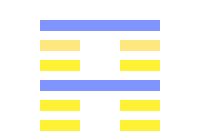
52.1.2.3.4.6 (52 > 54) - THE KĂN HEXAGRAM.
- 1. The first line, divided, shows its subject keep- ing his toes at rest. There will be no error; but it will be advantageous for him to be persistently firm and correct.
- 2. The second line, divided, shows its subject keeping the calves of his legs at rest. He cannot help (the subject of the line above) whom he follows, and is dissatisfied in his mind.
- 3. The third line, undivided, shows its subject keeping his loins at rest, and separating the ribs (from the body below). The situation is perilous, and the heart glows with suppressed excitement.
- 4. The fourth line, divided, shows its subject keeping his trunk at rest. There will be no error.
- 6. The sixth line, undivided, shows its subject devotedly maintaining his restfulness. There will be good fortune.
52.1.2.3.4.6 (52 > 54) - Stop
One does not weaken in order not to be seen failing.
Bing DeepL Google Yandex52.1.2.3.4.6 (52 > 54) - Stop
One does not weaken in order not to be seen failing.
Bing DeepL Google Yandex52.1.2.3.4.6 (52 > 54) - Kán, l’arrêt
Kán : ferme, tenir droit, bien réglé, arrêter, reposer
-
1. (On doit) tenir fermes ses pieds ; i. e. être toujours d’une ferme droiture.
Ne jamais perdre sa droiture. -
2. « Arrêter le mouvement des jambes ». (Ou les tenir droites et bien posées.) Si, devant s’arrêter, on ne peut aider celui qui marche devant soi, on doit en avoir du déplaisir.
On doit aider et se rendre au cri d’appel. - 3. Se tenir ferme à sa place et le corps (litt. : les côtes) bien tenu, (c’est ainsi que l’on doit être).
- 4. Tenir le corps droit et ferme, c’est une bonne manière. [On doit tenir le corps entier tout droit.] (Répétition du § 3 pour en avoir six. Tenir le corps droit est un principe essentiel des rites chinois.)
-
6. Être tout appliqué à rester ferme dans le bien est une disposition très heureuse.
On peut ainsi être juste et droit jusqu’à la fin.
52.1.2.3.4.6 (52 > 54) - Cesser
On ne faiblit pas pour ne pas se faire prendre en défaut.
Bing DeepL Google Yandex52.1.2.3.4.6 (52 > 54) - Megállás
- 1. Nem megy megnézni mit tesznek a többiek hogy kerülje a bajokat.
- 2. Ha a másik többet akar, nem tarthatja vissza.
- 3. A legalkalmasabbat kéri ha mások nem válaszolnak.
- 4. Megáll, de mások folytatják.
- 6. Tanulmányozza környezete igényeit mielőtt foglalkozna azokkal.

52.2.5.6 (52 > 48) - THE KĂN HEXAGRAM.
- 2. The second line, divided, shows its subject keeping the calves of his legs at rest. He cannot help (the subject of the line above) whom he follows, and is dissatisfied in his mind.
- 5. The fifth line, divided, shows its subject keeping his jawbones at rest, so that his words are (all) orderly. Occasion for repentance will disappear.
- 6. The sixth line, undivided, shows its subject devotedly maintaining his restfulness. There will be good fortune.
52.2.5.6 (52 > 48) - Stop
One advances while promising others to follow their advice.
Bing DeepL Google Yandex52.2.5.6 (52 > 48) - Stop
One advances while promising others to follow their advice.
Bing DeepL Google Yandex52.2.5.6 (52 > 48) - Kán, l’arrêt
Kán : ferme, tenir droit, bien réglé, arrêter, reposer
-
2. « Arrêter le mouvement des jambes ». (Ou les tenir droites et bien posées.) Si, devant s’arrêter, on ne peut aider celui qui marche devant soi, on doit en avoir du déplaisir.
On doit aider et se rendre au cri d’appel. -
5. Tenir ses mâchoires de sorte que les paroles sortent de la bouche avec ordre et mesure, cela exempte de repentir.
On sait ainsi conserver le milieu. -
6. Être tout appliqué à rester ferme dans le bien est une disposition très heureuse.
On peut ainsi être juste et droit jusqu’à la fin.
52.2.5.6 (52 > 48) - Cesser
On s'avance en promettant aux autres de suivre leurs conseils.
Bing DeepL Google Yandex52.2.5.6 (52 > 48) - Megállás
- 2. Ha a másik többet akar, nem tarthatja vissza.
- 5. Nem fejti ki kételyeit hogy ne okozzon nehézségeket.
- 6. Tanulmányozza környezete igényeit mielőtt foglalkozna azokkal.

52.1.2.5.6 (52 > 5) - THE KĂN HEXAGRAM.
- 1. The first line, divided, shows its subject keep- ing his toes at rest. There will be no error; but it will be advantageous for him to be persistently firm and correct.
- 2. The second line, divided, shows its subject keeping the calves of his legs at rest. He cannot help (the subject of the line above) whom he follows, and is dissatisfied in his mind.
- 5. The fifth line, divided, shows its subject keeping his jawbones at rest, so that his words are (all) orderly. Occasion for repentance will disappear.
- 6. The sixth line, undivided, shows its subject devotedly maintaining his restfulness. There will be good fortune.
52.1.2.5.6 (52 > 5) - Stop
One knows what will happen if one continues to hesitate.
Bing DeepL Google Yandex52.1.2.5.6 (52 > 5) - Stop
One knows what will happen if one continues to hesitate.
Bing DeepL Google Yandex52.1.2.5.6 (52 > 5) - Kán, l’arrêt
Kán : ferme, tenir droit, bien réglé, arrêter, reposer
-
1. (On doit) tenir fermes ses pieds ; i. e. être toujours d’une ferme droiture.
Ne jamais perdre sa droiture. -
2. « Arrêter le mouvement des jambes ». (Ou les tenir droites et bien posées.) Si, devant s’arrêter, on ne peut aider celui qui marche devant soi, on doit en avoir du déplaisir.
On doit aider et se rendre au cri d’appel. -
5. Tenir ses mâchoires de sorte que les paroles sortent de la bouche avec ordre et mesure, cela exempte de repentir.
On sait ainsi conserver le milieu. -
6. Être tout appliqué à rester ferme dans le bien est une disposition très heureuse.
On peut ainsi être juste et droit jusqu’à la fin.
52.1.2.5.6 (52 > 5) - Cesser
On sait ce qu'il va arriver si l'on continue à hésiter.
Bing DeepL Google Yandex52.1.2.5.6 (52 > 5) - Megállás
- 1. Nem megy megnézni mit tesznek a többiek hogy kerülje a bajokat.
- 2. Ha a másik többet akar, nem tarthatja vissza.
- 5. Nem fejti ki kételyeit hogy ne okozzon nehézségeket.
- 6. Tanulmányozza környezete igényeit mielőtt foglalkozna azokkal.
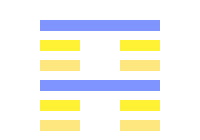
52.2.3.5.6 (52 > 29) - THE KĂN HEXAGRAM.
- 2. The second line, divided, shows its subject keeping the calves of his legs at rest. He cannot help (the subject of the line above) whom he follows, and is dissatisfied in his mind.
- 3. The third line, undivided, shows its subject keeping his loins at rest, and separating the ribs (from the body below). The situation is perilous, and the heart glows with suppressed excitement.
- 5. The fifth line, divided, shows its subject keeping his jawbones at rest, so that his words are (all) orderly. Occasion for repentance will disappear.
- 6. The sixth line, undivided, shows its subject devotedly maintaining his restfulness. There will be good fortune.
52.2.3.5.6 (52 > 29) - Stop
One is feverish because the others didn't want to come.
Bing DeepL Google Yandex52.2.3.5.6 (52 > 29) - Stop
One is feverish because the others didn't want to come.
Bing DeepL Google Yandex52.2.3.5.6 (52 > 29) - Kán, l’arrêt
Kán : ferme, tenir droit, bien réglé, arrêter, reposer
-
2. « Arrêter le mouvement des jambes ». (Ou les tenir droites et bien posées.) Si, devant s’arrêter, on ne peut aider celui qui marche devant soi, on doit en avoir du déplaisir.
On doit aider et se rendre au cri d’appel. - 3. Se tenir ferme à sa place et le corps (litt. : les côtes) bien tenu, (c’est ainsi que l’on doit être).
-
5. Tenir ses mâchoires de sorte que les paroles sortent de la bouche avec ordre et mesure, cela exempte de repentir.
On sait ainsi conserver le milieu. -
6. Être tout appliqué à rester ferme dans le bien est une disposition très heureuse.
On peut ainsi être juste et droit jusqu’à la fin.
52.2.3.5.6 (52 > 29) - Cesser
On est fébrile car les autres n'ont pas voulu venir.
Bing DeepL Google Yandex52.2.3.5.6 (52 > 29) - Megállás
- 2. Ha a másik többet akar, nem tarthatja vissza.
- 3. A legalkalmasabbat kéri ha mások nem válaszolnak.
- 5. Nem fejti ki kételyeit hogy ne okozzon nehézségeket.
- 6. Tanulmányozza környezete igényeit mielőtt foglalkozna azokkal.
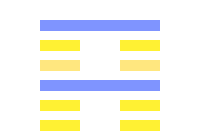
52.1.2.3.5.6 (52 > 60) - THE KĂN HEXAGRAM.
- 1. The first line, divided, shows its subject keep- ing his toes at rest. There will be no error; but it will be advantageous for him to be persistently firm and correct.
- 2. The second line, divided, shows its subject keeping the calves of his legs at rest. He cannot help (the subject of the line above) whom he follows, and is dissatisfied in his mind.
- 3. The third line, undivided, shows its subject keeping his loins at rest, and separating the ribs (from the body below). The situation is perilous, and the heart glows with suppressed excitement.
- 5. The fifth line, divided, shows its subject keeping his jawbones at rest, so that his words are (all) orderly. Occasion for repentance will disappear.
- 6. The sixth line, undivided, shows its subject devotedly maintaining his restfulness. There will be good fortune.
52.1.2.3.5.6 (52 > 60) - Stop
One concludes one's exercises with fun and games.
Bing DeepL Google Yandex52.1.2.3.5.6 (52 > 60) - Stop
One concludes one's exercises with fun and games.
Bing DeepL Google Yandex52.1.2.3.5.6 (52 > 60) - Kán, l’arrêt
Kán : ferme, tenir droit, bien réglé, arrêter, reposer
-
1. (On doit) tenir fermes ses pieds ; i. e. être toujours d’une ferme droiture.
Ne jamais perdre sa droiture. -
2. « Arrêter le mouvement des jambes ». (Ou les tenir droites et bien posées.) Si, devant s’arrêter, on ne peut aider celui qui marche devant soi, on doit en avoir du déplaisir.
On doit aider et se rendre au cri d’appel. - 3. Se tenir ferme à sa place et le corps (litt. : les côtes) bien tenu, (c’est ainsi que l’on doit être).
-
5. Tenir ses mâchoires de sorte que les paroles sortent de la bouche avec ordre et mesure, cela exempte de repentir.
On sait ainsi conserver le milieu. -
6. Être tout appliqué à rester ferme dans le bien est une disposition très heureuse.
On peut ainsi être juste et droit jusqu’à la fin.
52.1.2.3.5.6 (52 > 60) - Cesser
On termine ses exercices par une partie de plaisir.
Bing DeepL Google Yandex52.1.2.3.5.6 (52 > 60) - Megállás
- 1. Nem megy megnézni mit tesznek a többiek hogy kerülje a bajokat.
- 2. Ha a másik többet akar, nem tarthatja vissza.
- 3. A legalkalmasabbat kéri ha mások nem válaszolnak.
- 5. Nem fejti ki kételyeit hogy ne okozzon nehézségeket.
- 6. Tanulmányozza környezete igényeit mielőtt foglalkozna azokkal.

52.2.4.5.6 (52 > 28) - THE KĂN HEXAGRAM.
- 2. The second line, divided, shows its subject keeping the calves of his legs at rest. He cannot help (the subject of the line above) whom he follows, and is dissatisfied in his mind.
- 4. The fourth line, divided, shows its subject keeping his trunk at rest. There will be no error.
- 5. The fifth line, divided, shows its subject keeping his jawbones at rest, so that his words are (all) orderly. Occasion for repentance will disappear.
- 6. The sixth line, undivided, shows its subject devotedly maintaining his restfulness. There will be good fortune.
52.2.4.5.6 (52 > 28) - Stop
One updates one's data according to the new information one has received.
Bing DeepL Google Yandex52.2.4.5.6 (52 > 28) - Stop
One updates one's data according to the new information one has received.
Bing DeepL Google Yandex52.2.4.5.6 (52 > 28) - Kán, l’arrêt
Kán : ferme, tenir droit, bien réglé, arrêter, reposer
-
2. « Arrêter le mouvement des jambes ». (Ou les tenir droites et bien posées.) Si, devant s’arrêter, on ne peut aider celui qui marche devant soi, on doit en avoir du déplaisir.
On doit aider et se rendre au cri d’appel. - 4. Tenir le corps droit et ferme, c’est une bonne manière. [On doit tenir le corps entier tout droit.] (Répétition du § 3 pour en avoir six. Tenir le corps droit est un principe essentiel des rites chinois.)
-
5. Tenir ses mâchoires de sorte que les paroles sortent de la bouche avec ordre et mesure, cela exempte de repentir.
On sait ainsi conserver le milieu. -
6. Être tout appliqué à rester ferme dans le bien est une disposition très heureuse.
On peut ainsi être juste et droit jusqu’à la fin.
52.2.4.5.6 (52 > 28) - Cesser
On actualise ses données en fonction des nouvelles informations que l'on a reçues.
Bing DeepL Google Yandex52.2.4.5.6 (52 > 28) - Megállás
- 2. Ha a másik többet akar, nem tarthatja vissza.
- 4. Megáll, de mások folytatják.
- 5. Nem fejti ki kételyeit hogy ne okozzon nehézségeket.
- 6. Tanulmányozza környezete igényeit mielőtt foglalkozna azokkal.

52.1.2.4.5.6 (52 > 43) - THE KĂN HEXAGRAM.
- 1. The first line, divided, shows its subject keep- ing his toes at rest. There will be no error; but it will be advantageous for him to be persistently firm and correct.
- 2. The second line, divided, shows its subject keeping the calves of his legs at rest. He cannot help (the subject of the line above) whom he follows, and is dissatisfied in his mind.
- 4. The fourth line, divided, shows its subject keeping his trunk at rest. There will be no error.
- 5. The fifth line, divided, shows its subject keeping his jawbones at rest, so that his words are (all) orderly. Occasion for repentance will disappear.
- 6. The sixth line, undivided, shows its subject devotedly maintaining his restfulness. There will be good fortune.
52.1.2.4.5.6 (52 > 43) - Losing freshness
One finds something rotten in what should be impeccable.
Bing DeepL Google Yandex52.1.2.4.5.6 (52 > 43) - Losing freshness
One finds something rotten in what should be impeccable.
Bing DeepL Google Yandex52.1.2.4.5.6 (52 > 43) - Kán, l’arrêt
Kán : ferme, tenir droit, bien réglé, arrêter, reposer
-
1. (On doit) tenir fermes ses pieds ; i. e. être toujours d’une ferme droiture.
Ne jamais perdre sa droiture. -
2. « Arrêter le mouvement des jambes ». (Ou les tenir droites et bien posées.) Si, devant s’arrêter, on ne peut aider celui qui marche devant soi, on doit en avoir du déplaisir.
On doit aider et se rendre au cri d’appel. - 4. Tenir le corps droit et ferme, c’est une bonne manière. [On doit tenir le corps entier tout droit.] (Répétition du § 3 pour en avoir six. Tenir le corps droit est un principe essentiel des rites chinois.)
-
5. Tenir ses mâchoires de sorte que les paroles sortent de la bouche avec ordre et mesure, cela exempte de repentir.
On sait ainsi conserver le milieu. -
6. Être tout appliqué à rester ferme dans le bien est une disposition très heureuse.
On peut ainsi être juste et droit jusqu’à la fin.
52.1.2.4.5.6 (52 > 43) - Perdre sa fraîcheur
On trouve quelque chose de pourri dans ce qui devrait être impeccable.
Bing DeepL Google Yandex52.1.2.4.5.6 (52 > 43) - Megállás
- 1. Nem megy megnézni mit tesznek a többiek hogy kerülje a bajokat.
- 2. Ha a másik többet akar, nem tarthatja vissza.
- 4. Megáll, de mások folytatják.
- 5. Nem fejti ki kételyeit hogy ne okozzon nehézségeket.
- 6. Tanulmányozza környezete igényeit mielőtt foglalkozna azokkal.
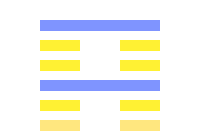
52.2.3.4.5.6 (52 > 47) - THE KĂN HEXAGRAM.
- 2. The second line, divided, shows its subject keeping the calves of his legs at rest. He cannot help (the subject of the line above) whom he follows, and is dissatisfied in his mind.
- 3. The third line, undivided, shows its subject keeping his loins at rest, and separating the ribs (from the body below). The situation is perilous, and the heart glows with suppressed excitement.
- 4. The fourth line, divided, shows its subject keeping his trunk at rest. There will be no error.
- 5. The fifth line, divided, shows its subject keeping his jawbones at rest, so that his words are (all) orderly. Occasion for repentance will disappear.
- 6. The sixth line, undivided, shows its subject devotedly maintaining his restfulness. There will be good fortune.
52.2.3.4.5.6 (52 > 47) - Stop
One takes upon oneself to trust those who have been disappointing before.
Bing DeepL Google Yandex52.2.3.4.5.6 (52 > 47) - Stop
One takes upon oneself to trust those who have been disappointing before.
Bing DeepL Google Yandex52.2.3.4.5.6 (52 > 47) - Kán, l’arrêt
Kán : ferme, tenir droit, bien réglé, arrêter, reposer
-
2. « Arrêter le mouvement des jambes ». (Ou les tenir droites et bien posées.) Si, devant s’arrêter, on ne peut aider celui qui marche devant soi, on doit en avoir du déplaisir.
On doit aider et se rendre au cri d’appel. - 3. Se tenir ferme à sa place et le corps (litt. : les côtes) bien tenu, (c’est ainsi que l’on doit être).
- 4. Tenir le corps droit et ferme, c’est une bonne manière. [On doit tenir le corps entier tout droit.] (Répétition du § 3 pour en avoir six. Tenir le corps droit est un principe essentiel des rites chinois.)
-
5. Tenir ses mâchoires de sorte que les paroles sortent de la bouche avec ordre et mesure, cela exempte de repentir.
On sait ainsi conserver le milieu. -
6. Être tout appliqué à rester ferme dans le bien est une disposition très heureuse.
On peut ainsi être juste et droit jusqu’à la fin.
52.2.3.4.5.6 (52 > 47) - Cesser
On prend sur soi de faire confiance à ceux qui ont été décevants auparavant.
Bing DeepL Google Yandex52.2.3.4.5.6 (52 > 47) - Megállás
- 2. Ha a másik többet akar, nem tarthatja vissza.
- 3. A legalkalmasabbat kéri ha mások nem válaszolnak.
- 4. Megáll, de mások folytatják.
- 5. Nem fejti ki kételyeit hogy ne okozzon nehézségeket.
- 6. Tanulmányozza környezete igényeit mielőtt foglalkozna azokkal.

52.1.2.3.4.5.6 (52 > 58) - THE KĂN HEXAGRAM.
- 1. The first line, divided, shows its subject keep- ing his toes at rest. There will be no error; but it will be advantageous for him to be persistently firm and correct.
- 2. The second line, divided, shows its subject keeping the calves of his legs at rest. He cannot help (the subject of the line above) whom he follows, and is dissatisfied in his mind.
- 3. The third line, undivided, shows its subject keeping his loins at rest, and separating the ribs (from the body below). The situation is perilous, and the heart glows with suppressed excitement.
- 4. The fourth line, divided, shows its subject keeping his trunk at rest. There will be no error.
- 5. The fifth line, divided, shows its subject keeping his jawbones at rest, so that his words are (all) orderly. Occasion for repentance will disappear.
- 6. The sixth line, undivided, shows its subject devotedly maintaining his restfulness. There will be good fortune.
52.1.2.3.4.5.6 (52 > 58) - Stop
One would like to move faster but the others need to rest.
Bing DeepL Google Yandex52.1.2.3.4.5.6 (52 > 58) - Stop
One would like to move faster but the others need to rest.
Bing DeepL Google Yandex52.1.2.3.4.5.6 (52 > 58) - Kán, l’arrêt
Kán : ferme, tenir droit, bien réglé, arrêter, reposer
-
1. (On doit) tenir fermes ses pieds ; i. e. être toujours d’une ferme droiture.
Ne jamais perdre sa droiture. -
2. « Arrêter le mouvement des jambes ». (Ou les tenir droites et bien posées.) Si, devant s’arrêter, on ne peut aider celui qui marche devant soi, on doit en avoir du déplaisir.
On doit aider et se rendre au cri d’appel. - 3. Se tenir ferme à sa place et le corps (litt. : les côtes) bien tenu, (c’est ainsi que l’on doit être).
- 4. Tenir le corps droit et ferme, c’est une bonne manière. [On doit tenir le corps entier tout droit.] (Répétition du § 3 pour en avoir six. Tenir le corps droit est un principe essentiel des rites chinois.)
-
5. Tenir ses mâchoires de sorte que les paroles sortent de la bouche avec ordre et mesure, cela exempte de repentir.
On sait ainsi conserver le milieu. -
6. Être tout appliqué à rester ferme dans le bien est une disposition très heureuse.
On peut ainsi être juste et droit jusqu’à la fin.
52.1.2.3.4.5.6 (52 > 58) - Cesser
On voudrait avancer plus vite mais les autres ont besoin de se reposer.
Bing DeepL Google Yandex52.1.2.3.4.5.6 (52 > 58) - Megállás
- 1. Nem megy megnézni mit tesznek a többiek hogy kerülje a bajokat.
- 2. Ha a másik többet akar, nem tarthatja vissza.
- 3. A legalkalmasabbat kéri ha mások nem válaszolnak.
- 4. Megáll, de mások folytatják.
- 5. Nem fejti ki kételyeit hogy ne okozzon nehézségeket.
- 6. Tanulmányozza környezete igényeit mielőtt foglalkozna azokkal.

